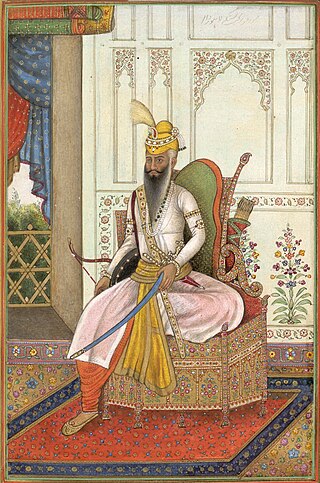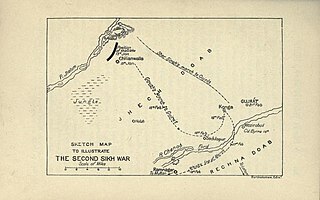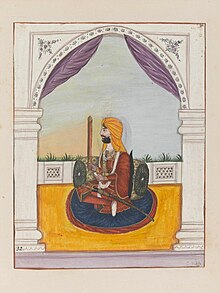
Ranjit Singh, popularly known as Sher-e-Punjab or "Lion of Punjab", was the first Maharaja of the Sikh Empire, which ruled the northwest Indian subcontinent in the early half of the 19th century. He survived smallpox in infancy but lost sight in his left eye. He fought his first battle alongside his father at age 10. After his father died around Ranjit's early teenage years, Ranjit subsequently fought several wars to expel the Afghans throughout his teenage years. At the age of 21, he was proclaimed the "Maharaja of Punjab". His empire grew in the Punjab region under his leadership through 1839.

The first Anglo-Sikh war was fought between the Sikh Empire and the British East India Company in 1845 and 1846 around the Ferozepur district of Punjab. It resulted in defeat and partial subjugation of the Sikh empire and cession of Jammu & Kashmir as a separate princely state under British suzerainty.

The second Anglo-Sikh war was a military conflict between the Sikh Empire and the East India Company which took place from 1848 to 1849. It resulted in the fall of the Sikh Empire, and the annexation of the Punjab and what subsequently became the North-West Frontier Province, by the East India Company.

The Battle of Sobraon was fought on 10 February 1846, between the forces of the East India Company and the Sikh Khalsa Army, the army of the Sikh Empire of the Punjab. The Sikhs were completely defeated, making this the decisive battle of the First Anglo-Sikh War.

The Battle of Aliwal was fought on 28 January 1846 between the British and Sikh forces in northern India. The British were led by Sir Harry Smith, while the Sikhs were led by Ranjodh Singh Majithia. Britain's victory in the battle is sometimes regarded as the turning point in the First Anglo-Sikh War.

Moga district is one of the twenty-two districts in the state of Punjab, India. It became the 17th district of Punjab State on 24 November 1995 cut from Faridkot district. Moga District is among the largest producers of wheat and rice in Punjab, India. People from Moga City and Moga District belong to the Malwa culture. The district is noted for being the homeland for a high proportion of Indian Punjabi expatriates who emigrated abroad and their descendents, which has given it the nickname of "NRI district".
Moga is a city in the Indian state of Punjab. It was made a part and headquarters of the Moga district on 24 November 1995, by the then Chief Minister Harcharan Singh Brar. Before becoming a district, Moga was a part of Faridkot District as a tehsil. Moga is situated on the National Highway 95. The area of Dharamkot block with 150 villages has been merged into Moga district, which falls under the jurisdiction of Ferozpur division.
Majitha is a town and a municipal council in Amritsar district in the Indian state of Punjab. The 2011 Census of India recorded 14,503 people resident in the town.

The Majithia family, are a family of Shergill Jat sardars (chiefs) that originate from the region of Majitha in the Punjab.
Shergill is a clan (gotra) of Jats, its parent clan is Gill. According to oral history, the founding progenitor of the clan was a man named Shergill, who was the son of Gill. The Majithia family belong to this clan.
Malaudh was a Cis-Sutlej Phulkian princely state of India till 1846, after which it was merged into the Ludhiana District by the British when they annexed the territories around Ludhiana. The town of Malaudh, or Maloud, is situated at a distance of about 40 kilometres from Ludhiana on the Ludhiana-Malerkotla Road and is linked by approach road kup-payal road though village Rorian which is now part of it as Nagar Panchayat. It lies on 75°- 56' Longitude and 30° – 38' Latitude. Malaudh is a very ancient place which was known as Malla Udey or rise of the Mallas with whom Multan or Mallustan is associated and later got corrupted to Malaudh. There was a The Loharan about 1 kilometer on the southern side which has now disappeared. Malaudh has a government high school (co-educational), middle school for girls and a primary school for boys, a post office, primary health centre and a veterinary dispensary. Malaudh became a part of the Ludhiana District when it was formed out of the territories annexed by the British in 1846.

Sardar Bahadur Sir Sundar Singh Majithia was a Punjabi landowner and politician.

The Nakai Misl, founded by Sandhu Jats, was one of the twelve Sikh Misls that later became the Sikh Empire. It held territory between the Ravi and Sutlej rivers southwest of Lahore in what became Pakistan. The misl fought against the Sials, the Pathans and the Kharals before it was incorporated into the Sikh Empire of the Sukerchakia Misl by Ranjit Singh.
Manawala is a city in Sheikhupura District, Punjab, Pakistan. It is situated on the Lahore-Sheikhupura-Faisalabad road.

The Battle of Baddowal, known by locals as Angauli Jetu Jang, was an attack on 21 January 1846 by troops of the Sikh Empire on a contingent of the British East India Company near Ludhiana in the present-day state of Punjab, India. The battle ended with a Sikh victory.

Surjit Singh Majithia (1912-1995) was an Indian politician, diplomat and air force officer. He was elected to the Lok Sabha, the lower house of the Parliament of India from the Tarn Taran constituency of Punjab as a member of the Indian National Congress.

Raja Surat Singh (1810–1881) was a Punjabi Jagirdar, a military officer in the Khalsa Army, and a member of the renowned Majithia family.
Mughalchak is a town in Gujranwala District, Punjab, Pakistan.












